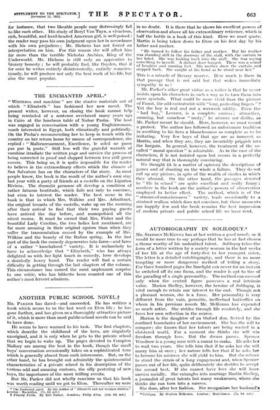THE ENCHANTED APRIL.* "Wism.rout and sunshine " are the elusive
materials out of which " Elizabeth " has fashioned her new novel. The present writer, however, on closing the book cannot help being reminded of a sentence overheard many years ago in Cairo at the luncheon table of Nubar Pasha. The host was engaged in conversation with a young Englishwoman, much interested in Egypt, both climatically and politically. On the Pasha's recommending her to keep in touch with the country on her return home by means of correspondence, she replied " Malheureusement, Excellence, le soleil ne passe pas par in poste." Still less will the grateful warmth of sunshine irradiate the written page and survive the process of being corrected in proof and clapped between two stiff green covers. This being so-, it is quite impossible for the reader to believe in the extraordinary effects which the climate of San Salvatore has on the characters of the story. As most people know, the book is the result of the author's own stay last year with a party of friends at a castello on the Ligurian Riviera. The dramatis personae all develop a condition of rather fatuous beatitude, which fails not only to convince, but even to interest the reader. The best scene in the book is that in which Mrs. Wilkins and Mrs. Arbuthnot, the original tenants of the castello, wake up on the morning after their arrival to find that their two paying guests have arrived the day before, and monopolized all the nicest rooms. It must be owned that Mrs. Fisher and the beautiful Lady Caroline, the two ladies last mentioned, arc far more amusing in their original egoism than when they suffer the transmutation caused by the example of Mrs. Wilkins and the beauty of the Italian spring. In the last part of the book the comedy degenerates into farce—and farce of a rather " knockabout " variety. It is melancholy to have to acknowledge that " Elizabeth," who has always delighted us with her light touch in comedy, here develops a decidedly heavy hand. The reader will find a certain difficulty in getting through the last chapters of the volume. This circumstance has caused the most unpleasant surprise to one critic, who has hitherto been counted one of this author's most fervent admirers.


























































 Previous page
Previous page